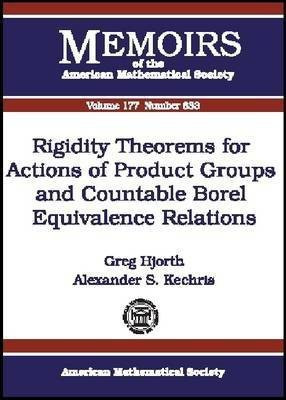Rigidity Theorems for Actions of Product Groups and Countable Borel Equivalence Relations(English, Paperback, unknown)
Quick Overview
Product Price Comparison
This memoir is both a contribution to the theory of Borel equivalence relations, considered up to Borel reducibility, and measure preserving group actions considered up to orbit equivalence. Here $E$ is said to be Borel reducible to $F$ if there is a Borel function $f$ with $x E y$ if and only if $f(x) F f(y)$. Moreover, $E$ is orbit equivalent to $F$ if the respective measure spaces equipped with the extra structure provided by the equivalence relations are almost everywhere isomorphic. We consider product groups acting ergodically and by measure preserving transformations on standard Borel probability spaces.In general terms, the basic parts of the monograph show that if the groups involved have a suitable notion of 'boundary' (we make this precise with the definition of near hyperbolic), then one orbit equivalence relation can only be Borel reduced to another if there is some kind of algebraic resemblance between the product groups and coupling of the action. This also has consequence for orbit equivalence. In the case that the original equivalence relations do not have non-trivial almost invariant sets, the techniques lead to relative ergodicity results. An equivalence relation $E$ is said to be relatively ergodic to $F$ if any $f$ with $xEy \Rightarrow f(x) F f(y)$ has $[f(x)]_F$ constant almost everywhere.This underlying collection of lemmas and structural theorems is employed in a number of different ways. In the later parts of the paper, we give applications of the theory to specific cases of product groups. In particular, we catalog the actions of products of the free group and obtain additional rigidity theorems and relative ergodicity results in this context. There is a rather long series of appendices, whose primary goal is to give the reader a comprehensive account of the basic techniques. But included here are also some new results. For instance, we show that the Furstenberg-Zimmer lemma on cocycles from amenable groups fails with respect to Baire category, and use this to answer a question of Weiss. We also present a different proof that $F_2$ has the Haagerup approximation property.


